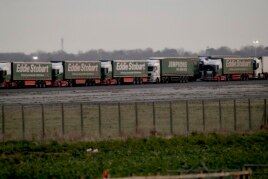07 August, 2019
Britain could experience shortages of some fresh foods for weeks or even months if the country leaves the European Union without a trade deal.
A British food industry group made the warning Wednesday. It said, if Britain withdraws from the EU without a trade agreement, fresh food may be left to go bad on trucks at ports.
Tim Rycroft is the Chief Operating Officer of Britain's Food and Drink Federation. He said, "We're not going to starve, but there will be shortages of fresh food and some specialist ingredients. It's going to be a little bit unpredictable."
"Given that food very often is perishable...we expect that there will be some selective shortages of food in the weeks and months following no-deal Brexit," Rycroft said. "There will be some shortages and price rises."
Officials of large food companies warn that leaving the EU, known as Brexit, could cause shortages because they may be unable to fill warehouses before the Christmas holiday.
The British food industry employs 450,000 people. The industry says Brexit may be the country's greatest challenge since World War II.

Some 150 trucks leave Manston Airfield during a 'no-deal' Brexit test for where 6,000 trucks could be parked at the former airfield near Ramsgate in south east England, Monday, Jan. 7, 2019.
A costly delay
Britain had planned to formally leave the EU on March 29 of this year. But the British Parliament failed to approve a deal negotiated with the 27 other member states. So Brexit has been delayed. There also is a possibility that Britain could withdraw from the EU without any agreement at all: a so-called no-deal Brexit.
British Prime Minister Boris Johnson has warned he will lead Britain out of the EU on October 31 without a deal unless a new one is negotiated.
After three years of Brexit discussion, it is still unclear on what terms Britain will leave the European Union. The possibilities include another delay or a deal reached at the last minute. It also includes the very real possibility that Britain will pull out of the EU without negotiating any new trade agreements. That could cause big problems for businesses that import products.
Every year, as the winter nears, Britain increases the amount of food it imports. That increased demand will start just as a no-deal Brexit will hold food at ports as officials try to deal with different import rules, Rycroft explained.
Fresh fruit and vegetables generally move from the French port at Calais to the British port at Dover. These products are only edible for a few days. A slowdown at either side could cause the food to go bad.
Rycroft said they estimated the cost of preparing for a no-deal Brexit to be as much as $120 million each week. That is because companies would have to find space to store products, use other distributors and accept large losses at ports.
Rycroft said that the industry spent a lot of money trying to prepare for the first two Brexit time limits in March and April.
A spokeswoman for the government said it was working to support "consumers and businesses in their preparation for Brexit."
Brexit supporters say there may be some small shortages if there is a no-deal Brexit. But, they argue, Britain's economy will grow quickly once it is freed from the European Union.
I'm Susan Shand.
The Reuters News Agency reported this story. Susan Shand adapted it for VOA Learning English. Mario Ritter Jr. was the editor.
Write to us in the Comments Section or on 51VOA.COM.
_______________________________________________________________
Words in This Story
warehouse – n. a large building used for storing goods
challenge – n. a difficult task or problem
ingredient – n. one of the things that are used to make a food,
perishable – adj. not likely to stay fresh for a long time if not eaten or used
edible – adj. safe to eat
distributor –n. a person or company that supplies stores or businesses with goods
consumer – n. one who buys things